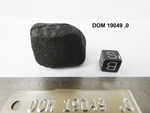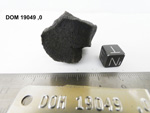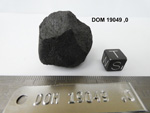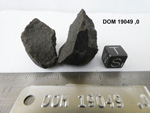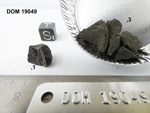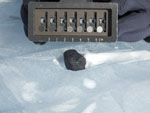| Newsletter |
44,2 |
| Location |
Dominion Range |
| Field Number |
26663 |
| Dimensions (cm) |
3.0 x 2.3 x 2.6 |
| Weight (g) |
34.93 |
| Original Classification |
CO3 Chondrite |
| Updated Classification |
CO3.05 Chondrite |
| Pairing |
DOM 08004;
DOM 03238;
DOM 08139;
DOM 08351;
DOM 10101;
DOM 10104;
DOM 14019;
DOM 14127;
DOM 14305;
DOM 18019;
DOM 18069;
DOM 19049;
DOM 19068;
DOM 19099;
DOM 19170;
DOM 19179;
|
| Fayalite (mol%): 1-56;Ferrosilite (mol%): 1-2 |
| A/Be |
| B |
| 70% of the exterior is covered with black, rough, vesicular fusion crust with mosaic fracturing. There are some white spots that might be evaporites and areas of dark brown rust. Exposed surface is coated with dark brown-red varnish with a few small, light colored inclusions visible. Fresh interior is very dark brown-black matrix with light grey and grey-brown inclusion up to 1 mm in size. |
| The sections consist of abundant small (up to 1 mm) chondrules, chondrule fragments, CAIs, and mineral grains in a dark matrix. Metal and sulfide occur within and rimming the chondrules. Olivine ranges in composition from Fa0-60. Pyroxene analyses range from Fs0-33. Terrestrial weathering effects are modest. Meteorites are similar enough that one description suffices, and they are likely paired. The meteorites are CO3 chondrites and may be members of the larger Dominion Range CO3 pairing group (named for DOM 08004). |
| Based on Type II (FeO-rich) chondrule olivine Cr content, this sample has been reclassified to CO3.05 chondrite. Details are reported in Righter, K. et al. (2024) Pairing relations within CO3 chondrites recovered at the Dominion Range and Miller Range, Transantarctic mountains: Constraints from chondrule olivines, noble gas, and H, C, N bulk and isotopic compositions. Meteoritics and Planetary Science 59; https://doi.org/10.1111/maps.14146. |
| Comparison of DOM 03238 to many of these samples reveals that it has the same CRE age, Type II chondrule olivine Cr2O3 contents, and H, C, and N elemental and isotopic compositions. Initially thought to have a high magnetite component, its mode is only slightly higher than that measured in a number of DOM 08004 pairing group CO3s (Rubin and Li, 2019). Given all this new information, we reclassify DOM 03238 as a CO3, and add it to the DOM 08004 pairing group. Data supporting this new pairing update for DOM CO3 chondrites were presented in Righter et al. (2021, 2022, 2023) and Rubin and Li (2019). |
